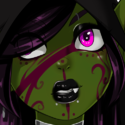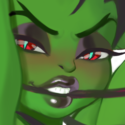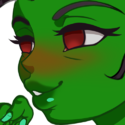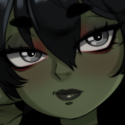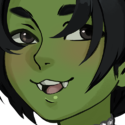Goblins
"Goblins are one of the most peculiar races in all of Savarra, if simply for their natural variability. Their race's gift of sampling the traits of any other race they mate with has resulted in such a wide variety of physical features that it can sometimes be hard to identify a goblin on sight."
—Herodos Naso, Acclaimed Historian
Writer Credit
| Balak Knightfang |
|---|
|
Codex
Name: Goblin (pl. Goblins)
Sexes:' Male/Female/See Reproduction
Height: 3' to 4'6" on base specimens of the race
Weight: 50 to 80lbs on average
Skin: The majority of Goblins have skin of varying shades of green, ranging from yellow-green to a deep forest green.
Hair: Goblin hair is normally roughly the same as a human's, though largely limited in natural color to blacks and browns.
Eyes: Goblins' eyes tend to look similar to those of humans or elves.
Ears: Goblins tend to have long, pointed ears that jut out from the side of their head.
Lifespan: 40 to 60 years
Maturity: 8 years
Description
Goblins are short, bipedal humanoids who inhabit Savarra. While the standard image of what makes a goblin a goblin—their height, skin coloration, and love of breeding—remains largely constant throughout the world, they're also prone to a larger variety of traits than just about any other race. As such, any description is more a generalization than a determining factor.
Normal goblin females have relatively proportional hips and breasts that average around B-cup before any children are born, but both rapidly gain size, up to F cups and especially large hips after several sets of children. Male goblins are usually thin, if often fit, and have human-like penises, and generally follow the same phallus size range of humans.
Reproduction
Goblins, much like harpies, frequently reproduce with members of other races, and those offspring always end up goblins. Unlike harpies, however, the goblin children with a parent of a different race may gain one or two of their non-goblin parent's racial traits, such as fur, genders beyond male and female, height, phallus type, and more. As such, many goblins will seek to reproduce with members of other races instead of those of their own. It's not uncommon for a goblin to stay with a mate out of a mix of love and a want to pass on as many different traits from the other parent as possible, though goblin/goblin pairings do occur and are generally the result of a love between the two.
The usual gestation period for a goblin is three months, during which time the physical changes to the mother occur. Goblins tend to have one to two offspring at a time, with triplets being a rare occurrence often hailed as a sign of a particularly virile mate or a blessing from the gods.
The raising of goblin children tends to fall upon the goblin parent, though this is not always the case. When the goblin parent remains with the other parent, or when both parents are goblins, for example, both parents are usually involved in the raising of the child, much as it would be for humans.
History
While much of the history of the goblin race was lost during the Godswar, some records and accounts of their race prior to the fall remain. It is known that they joined the Belharan Empire at its peak and rapidly spread through the empire. The quick dissemination of goblins throughout Savarra helped increase the variance among goblins as they mated with new races and allowed them to survive the Godswar. They were able to join the remote communities that survived, or take residence in some of the less insular cities. Unfortunately, where they came from prior to the empire has been largely lost to history, a fact that irks many of the naturally curious goblins to no end and has resulted in a fair share of their people to go out and become varying forms of archaeologists in search of their histories.
Society & Culture
Although goblins are an incredibly disjoint race, families of goblins still maintain remnants of their prewar culture, though what is remembered is often corrupted or differs from what is remembered by other groups of goblins that survived the Godswar.
Goblin families are typically ruled democratically, with each member voting on any large —or sometimes even medium—decisions that affect the family. That said, the oldest among them typically have the de facto power, with the others often following the motions of the elders they favor. Whenever members of other races join goblin families, the family typically attempts to assist the new member in getting used to this system of voting, but when a goblin joins another system, they're quick to adapt to the new family's way of life.
Goblins as a race tend to be naturally curious, resulting in a plethora of fields influenced by goblins. It's not uncommon to run into goblin alchemists, mages, and explorers, in addition to the aforementioned archeological tendencies.
Racial Differences
Because goblins take traits from non-goblin parents, families of goblins that have lived amongst another race will gradually take on more and more traits as generations pass. Because of this, it's not uncommon to see goblins with cat ears and a tail in Jassira or ones with scales and fin ears in Tyria, for example. Researchers have theorized that after long enough, goblins merge with the races around them, but thus far no proof of this happening is known to exist. Others believe that they'll end up diverging and becoming separate from both races.
Codex Acquisition
Only one of the conditions below must be met to unlock the Goblins Codex entry:
- Having talked about Goblins with Nelia while at The Frost Hound
Other Information
Reading the Goblins Codex Entry will unlock a minor scene variety when obtaining the Goblin Broodmare perk through a Grottato
| Adjectives |
|
|---|---|
| Cute Adjectives |
|
Transformatives
Gameplay Attributes
| Affinities |
|---|
